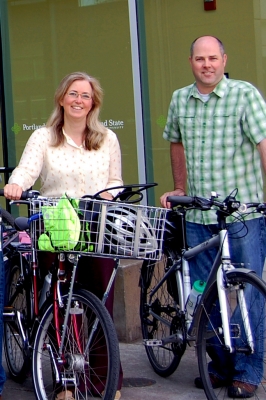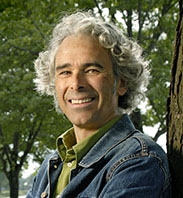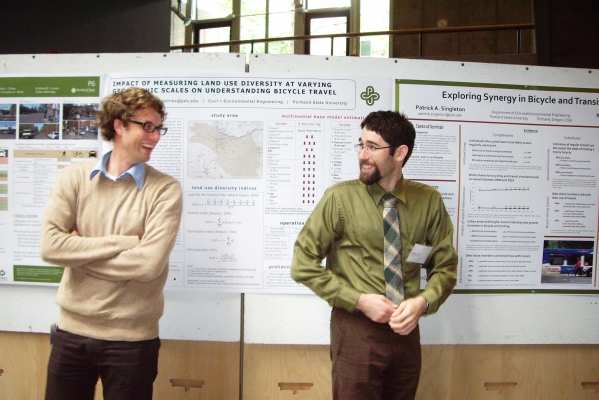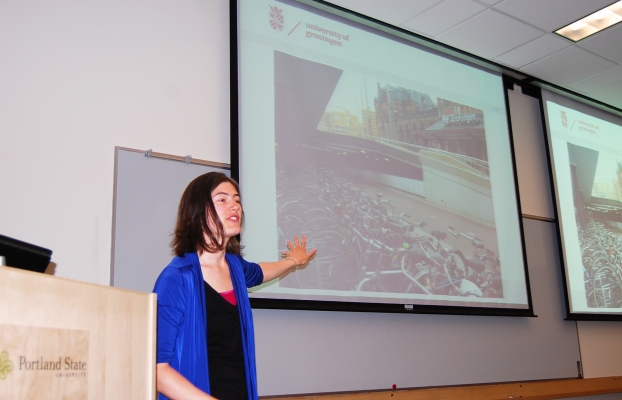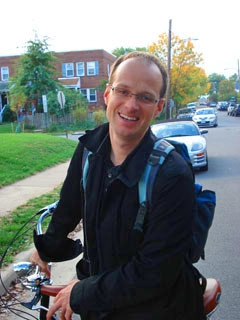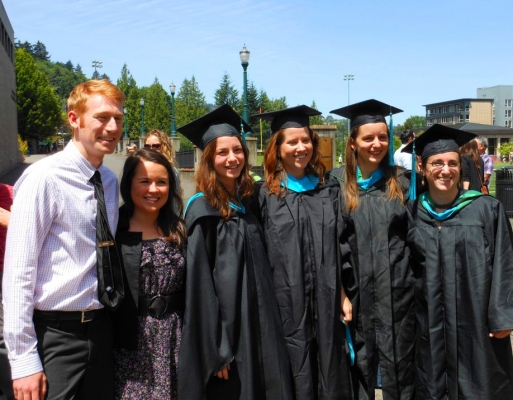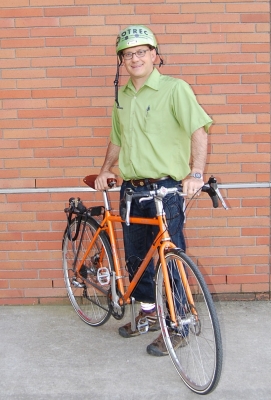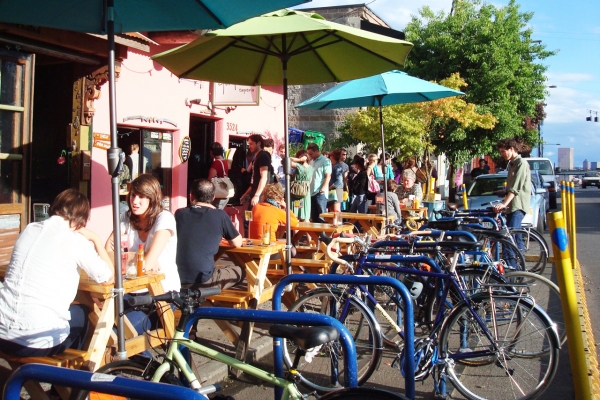The Ann Niles Transportation Lecture series opens Aug. 26 with a lecture from Jean-François Pronovost of Vélo Québec titled "Growing a World-Class Cycling Culture: Lessons from Québec." The series is sponsored by the Ann Niles Transportation Lecture Endowment and serves as a legacy to Ann Niles, an advocate for livable neighborhoods.
Philip Niles created the endowment with a gift to the Initiative for Bicycle and Pedestrian Innovation, or IBPI, in honor of his late wife. Ann Niles was a strong advocate for livable neighborhoods and served on many transportation-related boards and committees in Portland.
The lecture series keeps alive the spirit of Ann Niles' advocacy. Niles pushed for better sidewalks and crosswalks to make Portland a safe and comfortable place to walk, and for bicycle routes and parking to do the same for bicycling.
"This inaugural Ann Niles Transportation Lecture, and all those that follow, help spread Ann's passion for creating livable neighborhoods to students, practitioners and the greater community," said OTREC Director Jennifer Dill.
The series' first speaker, Pronovost, has helped bring active transportation into the lives of people in communities across Québec. As vice president for development and public affairs for Vélo Québec, he helps develop new projects and partnerships.
One of the...
Read morePortland, Oregon is known for being a bike city, even called America's Best Bike City by Bicycling Magazine, so it's no surprise at all that Portland State University is full of bike enthusiasts.
OTREC at Portland State University welcomed Eva Heinen of the University of Groningen, The Netherlands, for a special seminar June 18. Around 40 people attended the presentation, held at the Intelligent Transportation Systems Laboratory and titled “Cycling in the Netherlands and Multi-Modality.”
Eva Heinen is assistant professor of infrastructure planning and mobility at the Department of Spatial Planning and Environment, Faculty of Spatial Sciences, University of Groningen. She earned a Ph.D. from Delft University of Technology in 2011 focusing on bicycle commuting.
Many people in Groningen and The Netherlands as a whole combine transit and bicycling for trips. A typical configuration involves cycling from home to a train station and then renting another bicycle to reach the final destination, Heinen said.
Few people take bicycles on transit, Heinen said, and buses don’t offer bike racks or other accommodations. Folding bikes, whose compact size allows for portability, are one exception, Heinen said. Electric-assist bikes are also popular, particularly with older people.
Heinen has published many papers on cycling in international and national journals and has a large international network in cycling. She spent three months at the University of California in Davis as a visiting scholar. She is a member of the editorial board of Rooilijn, a Dutch journal for science and policy in spatial planning; a member of the Bicycle Committee; co-chair of the...
Read moreWhat makes Americans’ travel behaviors so different from that of their West European counterparts? Longer trip distances? Higher rates of licenses and auto-ownership? A culture and economy that depends on the automobile industry? According to visiting scholar Ralph Buehler, none of these explain the differences in mode splits.
In partnership with Students in Transportation Engineering and Planning (STEP), Portland State University recently hosted visiting scholar Ralph Buehler at the Friday Transportation Seminar series. Dr. Buehler traveled west from Washington, D.C. where he is an Assistant Professor in Urban Affairs and Planning at Virginia Tech’s Metropolitan Institute. Dr. Beuhler’s research and expertise is in multimodal planning and travel behaviors, with a focus on Western Europe and North America.
Click here to view the webcast.
Dr. Buehler’s presentation, titled “Making Urban Transport Sustainable: Comparison of Germany and the US,” poked holes in many of the common theories explaining why Americans are more likely to use their cars for all their travel needs. Instead, he noted that, “transport policies have to explain the difference [in mode shares] over time, including the changes that have happened in Germany and those that have not happened in the US. ” His research has led him to identify four major policy...
Read moreA new transportation class at the University of Oregon, launched in January 2013 and funded by grants from OTREC and NITC, by all accounts had a wonderful first term.
Conceived as part of the curriculum for the Oregon Leadership in Sustainability (OLIS) program at U of O, the course, titled Sustainable Transportation, will be a permanent part of the OLIS class roster and will be open to all graduate students at the university.
The class this winter, led by instructors Ann Scheerer and Larisa Varela, taught applied research in a real-world setting. Students worked on planning projects for the university and for its home community, the City of Eugene, Ore.
On March 20, 2013, U of O's Transportation and Livability Student Group, LiveMove, hosted a public event where students were invited to present their research and interested community members were invited to attend.
The day of the presentations in Eugene was exciting; the “icing on the cake” for Scheerer. Marc Schlossberg, OTREC/NITC executive committee member at U of O and faculty advisor for LiveMove, was there, and so were some professors from the planning department, staff from the sustainability office, and quite a few local transportation advocates.
Scheerer, a...
Read moreSix graduate students from the Master of Urban and Regional Planning program at Portland State University have been awarded a national prize by the American Planning Association.
The research team, working under the name Celilo Planning Studio, won the 2013 APA student award for Application of the Planning Process.
Team members Danielle Fuchs, Michael Ahillen, Ellen Dorsey, Chloe Ritter, Sara Morrissey and Sarah Bronstein were honored for excellence in the way they carried out their project plan.
Ritter, Morrissey and Bronstein accepted the award on behalf of the group at the APA national conference this month in Chicago.
“We were very excited to attend APA and receive the award,” said Morrissey, the team’s communications director. “The conference is great to learn about what other cities are working on and get a feel of what’s going on.”
Morrissey and other members of the planning team have OTREC connections. She and Chloe Ritter worked with PSU professor Kelly Clifton on a consumer spending project, with a focus on cyclists and pedestrians. Sarah Bronstein has also worked on...
Read moreOTREC research associate John MacArthur, in partnership with Drive Oregon, has been awarded a grant from Metro.
The grant is part of a $2.1 million effort by Metro to improve air quality and community health.
With the Metro grant, Drive Oregon and MacArthur plan to conduct a study of consumer perception and use of electric bicycles, pedal-bikes that provide extra propulsion from a rechargeable battery.
The idea is to see whether having the use of an e-bike will persuade non-bicycle-commuters to use a bike for the “first and last mile” of their daily commute; for example, to get from their workplace to the nearest MAX light rail station.
The e-bikes provided in the study will be foldable for convenient carrying onto the train. Ultimately, the partners of this study hope to increase the percentage of people who commute by bicycle and light rail, thus contributing to overall community health by reducing automobile emissions.
30 e-bikes will be loaned to 180 employees of Kaiser Permanente, at three designated work locations. Each participant will have the free use of an e-bike for one month, bookended by surveys about their expectations and perceptions of the experience.
MacArthur is conducting some overlapping research into e-bike use in a...
Read moreBicycle commuters represent a significant chunk of business consumers in Portland, Ore., one of America's most bike-friendly cities. OTREC research in the past year has provided data on how cyclists and other mode users patronize local businesses.
OTREC extends a warm welcome to Research Associate Krista Nordback, Ph.D., P.E., the newest member of the team. She just moved to Portland, Oregon after finishing up her Ph.D. in Denver, Colorado, to continue working on her favorite research focus: urban bicycle safety.
Nordback has been riding bikes since before she was old enough to remember. Together with her husband, Kurt, she continues to enjoy it as a form of both recreation and transportation. When the pair moved to Portland in February of this year, one of their first actions was to bike the Springwater Corridor, the Portland metro area’s 21-mile bike trail, all the way from Portland to Boring on their semi-recumbent tandem.
As a bicycle commuter, safety is one of Nordback’s top priorities, and it’s also the primary goal of her civil engineering research. In her PhD thesis, “Estimating Annual Average Daily Bicyclists and Analyzing Cyclist Safety at Urban Intersections,” she came up with methods for determining the average number of cyclists passing through a given intersection on a daily basis. In order to increase bicycle safety measures in urban areas, one of the first steps is simple yet essential: count the bikes. Having an understanding of the numbers of bicycles that traffic through an area is the starting point for coming up...
Read more
